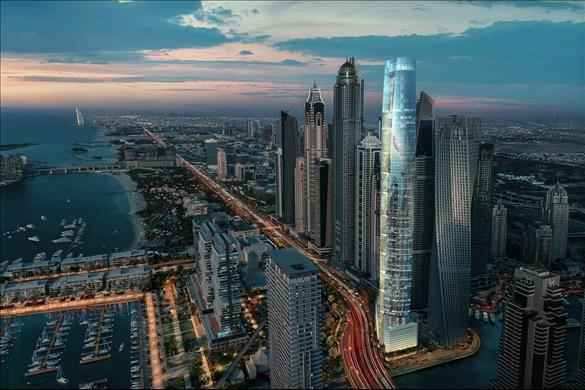
UAE- Post-Covid building management in Mideast to have tech-enabled focus
(MENAFN- Khaleej Times) Real estate advisor Savills recently launched the third edition of its global impacts study in the Middle East during a webinar. Addressing issues as diverse as the impact of climate change on building design and construction, to vertical farming for greater food security in the Middle East, the report identified smart buildings and smart cities as a key area of growth in the near future.
Acknowledging the Covid-19 pandemic as one of the great tipping points of our times, the report - as well as speakers during the webinar - placed a strong emphasis on technology as the enabler of a more efficient, sustainable and resilient model of real estate and communities.
Savills is hardly alone in advocating a tech-enabled future in the management of buildings and communities in the Middle East. The Middle East & Africa Building Management System Market (2020-2026): Market Forecast by Research and Markets projects the MEA building management system market to grow at a compound annual growth rate of 4.2 per cent from 2020-26. The report identifies Dubai Vision 2021 and Saudi Vision 2021 initiatives as powerful drivers of regional growth in the ongoing smart building and smart cities revolution.
The new normal has turned a desirable upgrade into the optimal operating model. Like almost everything else in our world, the likely future trajectory of the building management systems market too has undergone a definitive change, in the aftermath of the ongoing pandemic. The crisis has bluntly bared operational inadequacies in the commercial real estate industry, revealing gaps in service and emergency capabilities, which can no longer be ignored.
Dubai, with its numerous multi-tower complexes, has already actively leveraged technology-driven strategies for building management, in response to the Covid-19 crisis.
Considering that a significant number of Dubai's buildings are BAS-enabled to varying degrees, the ability to automate, remotely and centrally control systems such as HVAC, lighting, security and access control has demonstrated the value of these tech upgrades, in recent months.
Digital solutions, built using the Internet of Things, artificial intelligence, machine learning and cloud technologies, have allowed facilities management teams and real estate owners the leeway to make data-driven decisions and leverage predictive analytics, in response to the post pandemic public and living space regulatory guidelines.
Restoring consistency, control through proptech
As a significant contributor to national GDP, the sooner and more ably that the commercial real estate industry in the UAE adapts to the post-Covid new normal, the greater its ability to positively impact the economy and the environment. Fortunately, the challenges that the industry needs to overcome, in order to make this transition, map well onto the capabilities that the latest generation of proptech solutions enables.
Commercial real estate businesses that have been able to leverage remote management of assets and unified automation systems have been able to minimize the stress of disruption to legacy business operations.
With so many mechanisms and parameters, from supply chains to market demand, altered by the nature and scale of the crisis, businesses have had to rely on optimising their processes and enhancing their ability to achieve consistent outcomes. Reducing equipment downtime, optimising resource utilisation and minimising inefficiencies is now an even greater prerogative than before, and digital solutions provide the most effective means to achieve these outcomes.
The pandemic has ensured that accelerated digital transformation will be one of the industry's main focus areas, in the near to mid-term future.
Digitisation as enabler of agile, state-of-the-art building management
Implementing an appropriate suite of next-gen digital technologies will not only restore predictability to commercial real estate operations - it also gives future ready businesses an avenue to deliver much greater value to prospective and current clients.
Technology adoption has assumed even greater viability and context in the wake of the pandemic, but it will also emerge as a strong brand differentiator, especially in a market as competitive and discerning as Dubai, and the UAE in general.
The canvas of possibilities enabled by emerging technologies is really quite vast. For instance, blockchain will enable unprecedented transparency and reliability to the escrow accounts, billing and records of jointly-held properties. Some of the most topical enhancements - in the wake of the hygiene requirements, social distancing and touchless access that is set to become the new norm - are going to be the digital 'smart retrofitting' of existing buildings.
With emerging technologies like iiBMS (integrated intelligent building management system), AI, machine learning and advanced analytics companies are able to improve the safety, security and energy efficiency of the buildings and all the solutions can be integrated into a single point of control called the integrated command and control centre (ICCC). The ICCC integrates advanced IoT software and hardware solutions onto one common platform for a holistic upgrade and management of smart buildings and smart cities.
Restoring the confidence of tenants, occupants and prospective buyers, will be a major area of focus for the industry in the post-Covid world. Implementing IoT- and AI-enabled building management is the most logical and cost effective way, to meet and exceed standards that will satisfy expectations of infallible safety and resilient systems.
The writer is CEO of Netix Global. Views expressed are his own and do not reflect the newspaper's policy.

Legal Disclaimer:
MENAFN provides the
information “as is” without warranty of any kind. We do not accept
any responsibility or liability for the accuracy, content, images,
videos, licenses, completeness, legality, or reliability of the information
contained in this article. If you have any complaints or copyright
issues related to this article, kindly contact the provider above.


















Comments
No comment